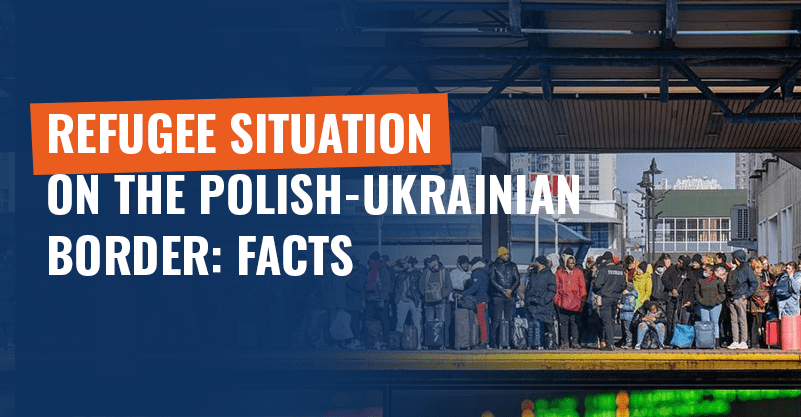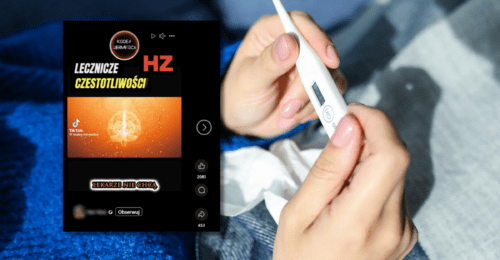Obalamy fałszywe informacje pojawiające się w mediach społecznościowych oraz na portalach internetowych. Odwołując się do wiarygodnych źródeł, weryfikujemy najbardziej szkodliwe przykłady dezinformacji.
What do we know about refugee situation on the Polish-Ukrainian border?
Unconfirmed information and rumors are making rounds on the Internet

What do we know about refugee situation on the Polish-Ukrainian border?
Unconfirmed information and rumors are making rounds on the Internet
Recently, a wave of news about the situation on the Polish-Ukrainian border, crossed by thousands of refugees, has started circulating on various websites. They claim that – contrary to the statements of the Polish government – not everyone is allowed into our country. Black refugees are said to have major difficulties when crossing the border.
In addition, social media users share „information found on the web” (i.e.: unverified) that a majority of refugees admitted to Poland are from outside of Ukraine.
According to one of the viral posts, at the crossing in Korczowa at one point the situation was allegedly as follows: “95% of people are healthy guys from Afghanistan, Nigeria, Lebanon, gypsies. Let me be clear, I am not a racist, but I am surprised that there are no Ukrainians there ”.
Considering the sheer volume of information, it is difficult to see what is fact and what has been distorted, which content is false and which is true, but does not reflect the full scope of the situation. In this article, we gather information that we’ve managed to confirm at the moment.
The article is regularly updated. Last Update: March 11th, 2022 at 1:00 PM.
Who can enter our country? According to the Polish government – anyone fleeing the war in Ukraine
As the Minister of Interior and Administration announced at a press conference on February 27th, 2022:
“Poland will be a safe haven for refugees from Ukraine. Until the situation in Ukraine returns to normal, every Ukrainian looking for shelter in Poland will be able to find it. ”
Mariusz Kamiński, Minister of the Interior and Administration
Same information is available on the government website of the Office for Foreigners. It’s added that this also applies to people who want to return to their homeland outside of Europe (in case of any issues, refugees should contact their country’s embassy).
At the border, refugees are directed to reception points where they can get more information about their stay in Poland, while also receive temporary accommodation, meals, or basic medical care. The Ministry of Interior and Administration also ensures that refugees „do not have to worry about the legal aspects of their stay”.
Long queues form at the Polish border
People crossing the border now can expect a very long waiting time to enter Poland. This is due to the enormous amount of traffic.
Lieutenant Colonel of Border Guard Piotr Zakielarz, the press spokesman of the commander of the Bieszczady Border Guard Department, emphasizes that despite the crisis, border guards performs all necessary activities to ensure the safety of citizens. They carry out their statutory tasks. To make traffic as smooth as possible, some paperwork procedures have been simplified: check-ins are carried out as quickly and as safely as possible. An average inspection of one person can take a few minutes, but the Border Guard has to perform additional activities concerning some refugees – precisely for security reasons.
Lieutenant Colonel BG Piotr Zakielarz also confirmed that people who are currently fleeing the war in Ukraine are admitted to Poland after border control.
The Border Guard publishes updates about traffic on the border on a regular basis
The Border Guard publishes detailed data on the migration of refugees in the Russian-Ukrainian war on its Twitter account. From there we know that only on February 27th 2022 almost 100,000 people entered Poland. In total, by February 28th, nearly 350,000 people crossed the border.
At the same time, it should be noted: according to the information from the Ministry of Interior and Administration, the dominant group of refugees in Poland are citizens of Ukraine. Reports that the majority of people fleeing the Russian invasion are people who are not Ukrainian citizens are untrue.
(2/3) Mamy potwierdzone informacje z @MSWiA_GOV_PL w związku z wojną w Ukrainie:
✅DOMINUJĄCĄ GRUPĄ UCHODŹCÓW W POLSCE SĄ OBYWATELE UKRAINY✅
Doniesienia, jakoby wśród osób uciekających przed inwazją Rosji przeważali ludzie niebędący obywatelami Ukrainy, są nieprawdziwe. pic.twitter.com/0KrsgdUBQk
— 🔎 DEMAGOG (@DemagogPL) March 1, 2022
Are black refugees from Ukraine not being allowed into our country? Fake news!
On the Internet, there were also posts claiming that in some places, the borders were crossed mainly by foreigners without Ukrainian citizenship.
As the Press Department of the Ministry of Interior and Administration has informed us:
„The dominant group of refugees in Poland are citizens of Ukraine, but among the people cleared by the Border Guard there are also citizens of the USA, Nigeria, India, Georgia, and other countries.
All persons admitted to Poland are verified by the Border Guard. Border Guard officers apply appropriate screening procedures to those who are in an uncertain legal situation, e.g. have no documents.
No person given shelter in Poland will ever be sent back to a country at war”.
Press Department of the Ministry of Internal Affairs
According to the Ukrainian migration service, in 2019 there were about 400,000 foreigners living in the country.
Nearly 80,000 foreign students stayed in Ukraine
Students from Africa choose Ukraine as a place to study because of lower cost of living, compared to the United States or other European countries.
Young people from many corners of the world study in Ukraine (in total: 155 countries) – most from India (more than 18 thousand people), Morocco (almost 9 thousand), and Turkmenistan (almost 5.5 thousand). As for other African countries, further down the list are Nigeria (over 4 thousand) and Egypt (over 3 thousand), among others. This brings the total to over 76,500.
There is a lot of information coming from the border about alleged discrimination against refugees without a Ukrainian citizenship. There are posts on social media that spread rumors about „pushing” such people „from border to border”.
Absolute RACISM on Poland-Ukraine border !!🇺🇦 🇵🇱
International students have been pushed from border to border by #Polish authorities ! They are being denied entry into #Poland !! I am so disgusted !!
Is this humanity @AndrzejDuda ?
The staff @IndiainPoland need to do more pic.twitter.com/6gcZhwA2I1
— ravinder singh (@RaviSinghKA) February 27, 2022
Denouncement from the Prime Minister’s Office
Under one Tweet regarding the matter, a response from the Prime Minister’s Office of the Council of Ministers appeared, with an appeal to stop spreading disinformation.
#StopFakeNews! Refugees fleeing war-torn Ukraine are entering Poland regardless of their nationality. The dominant group in need of refuge in 🇵🇱 are 🇺🇦, but among those cleared by the Border Guard are also citizens of other countries such as: 🇺🇸, 🇳🇬, 🇮🇳, 🇬🇪 and others. pic.twitter.com/xDk8F1umU0
— Chancellery of the Prime Minister of Poland (@PremierRP_en) February 26, 2022
IBIMS warns against disinformation
The Institute for Internet and Social Media Research warns on its Twitter account that this type of “news” is part of a disinformation campaign aimed at discrediting Poland and Ukraine’s image concerning helping refugees.
🔴ALERT🔴
Od kilku godzin pod hasztagiem #AfricansinUkraine trwa dynamiczna operacja dezinformacyjna której celem jest zdyskredytowanie / osłabienie wizerunku #Polska #Ukraina na arenie międzynarodowej w temacie pomocy #uchodzcy— Instytut Badań Internetu i Mediów Społecznościowyc (@ibimspl) February 27, 2022
Various messages were presented in the media, not just social media
Reports from social media users and media narratives (including a widely discussed piece by the BBC) have stated that black refugees are not allowed on trains leaving Ukrainian cities for Poland, that they are not let through the border, or that after crossing the border they are denied accommodation because they are not Ukrainian.
Such cases, of course, don’t have to be examples of deliberate misinformation. It is important to remember, however, that the experience and accounts of a few or a dozen people may be a signal that something is wrong, but they do not yet prove that it was an act of discrimination or that it is a widespread phenomenon.
Sometimes the causes of such events may be, for example, logistic issues or simply information chaos. Ukraine’s foreign minister, Dmytro Kuleba, assured Geoffrey Onyeama, Nigeria’s foreign minister, in a conversation with the Nigerian minister that „There are no restrictions for foreigners to leave the country. The problem is a result of chaos at the border and the checkpoints leading to them.”
1/4 Spoke on the phone with the Minister of Foreign Affairs of Ukraine, Dmytro Kuleba. Expressed sympathy for the needless loss of life and destruction and reiterated Nigeria’s recognition of Ukraine's sovereignty and territorial integrity.
— Geoffrey Onyeama (@GeoffreyOnyeama) February 27, 2022
We asked the Border Guard about the situation on the Polish side. As the Head of the Control Department of Bieszczady Border Guard Unit in Przemysl, Lieutenant Colonel BG Dariusz Kochanowicz answered us:
„(…) I would like to inform that in the Bieszczady Border Guard Unit’s official capacity there were no cases of refusal of entry to persons fleeing the war in Ukraine, regardless of their citizenship or skin color. However, there are instances that border checks of certain foreigners may be prolonged due to the necessity of fulfilling formal requirements related to their entry – e.g. obtaining a permit to enter, the necessity to collect an application for international protection or collecting a declaration of willingness to apply for protection after entering the country. Due to the unprecedented scale of the influx of persons to Poland, it may happen that the permission for entry does not take place as quickly as expected, despite the fact that the Border Guard deploys maximum forces and resources to carry out border checks. However, we try to make those procedures as brief as possible and for the conditions in which foreigners await permission to enter to be decent, including food. However, there is no risk of sending anyone back to Ukraine – thus, answering the second question, I state that decisions to refuse entry are not issued.
Therefore, please consider the information about refusal of entry to citizens of countries other than Ukraine as false and do not disseminate it”.
Lieutenant Colonel Border Guard Dariusz Kochanowicz, Head of the Control Division of Border Guard in Przemysl
Are there procurers and assaults going on at the borders? Police verifies every report
Several „warnings” have appeared, stating that procurers (pimps) could be seen at the borders, who under the guise of offering help, abduct young women. We wrote to the Provincial Police Office in Rzeszow regarding this matter. On February 28th, we received a reply from Sub-Insp. Marta Tabasz-Rygiel, Spokeswoman for the Regional Police Commander in Rzeszów:
„(…) I would like to inform you that the Podkarpackie Police Department has not received any report of a crime of this nature. Nevertheless, this issue also remains in our interest, each report will be checked. I assure you that policemen from the criminal division are also on duty at the border, at reception points. Their task is to ensure the safety of people who seek help in Poland and to prevent them from falling victim to crimes such as theft, fraud or human trafficking”. Subinsp. Marta Tabasz-Rygiel, Spokesperson of the Regional Police Commander in Rzeszów
Subinsp. Marta Tabasz-Rygiel, Spokeswoman for the Regional Police Commander in Rzeszów
Another piece of information that circulated the Internet tells about alleged assaults of refugees on women. This case, on March 1, 2022, was commented by the Spokeswoman of the Regional Police Chief in Rzeszow:
„(…) the Police receive information about various situations that allegedly take place in the border area, most of them are rumors that are not confirmed. (…)
We try to verify such reports. We have not noticed an increase in the number of crimes recently, or in the number of serious criminal incidents. In certain situations, the need for police intervention is inevitable in this unique, difficult situation. Every day, at border crossings, reception points and access roads, there are thousands of people crossing the border and seeking shelter in Poland.
At the border you’ll find not only uniformed patrols, but also officers from the criminal division on duty, patrolling the reception points, and access roads to the border. They are there to prevent anyone from falling victim to crime – theft, fraud, or acts related to human trafficking”.
Subinsp. Marta Tabasz-Rygiel, Spokesperson for the Regional Police Commander in Rzeszów
She also added that there are rumors circulating in social media that are not true, and repeatedly sharing or commenting on those can cause real issues and real concern. Caution is highly recommended, as is reporting similar cases to appropriate services.
Incidents and the wider context
It is important to remember that any accounts that describe bad experiences at the border are not necessarily part of a planned disinformation campaign. These may be real situations, but individual cases do not yet speak truth to the scale of the phenomenon and may distort the perception of the situation. Certainly, they are a sign for organizations that help people affected by such experiences.
Such reports are very difficult to verify, so we should not immediately assume that they are proof of a widespread phenomenon – this applies both to reports of problems of black refugees at the border and reports of alleged assaults on women.
Officials encourage people to report such incidents if they have concerns. There is also no shortage of positive accounts of black refugees online – for example, in Anna Kruczyńska’s article on Onet.pl, as well as on Twitter:
It's not true. I spent 2 nights at Przemyśl train station and I can say there was a lot of non white people, they were treated with kindness and respect, just like everybody else. pic.twitter.com/b6kpui12RF
— Miguel A Gayo Macías (@MiguelitoPol) February 28, 2022
Latest from the Polish border . Thank you Dr Tade,President Nido Poland,embassy staff and the whole team #Ukraine @NIDOEurope1 @VisserLola pic.twitter.com/BhvLkxSdz7
— Crypto Genesis 100x 📖🔥🚀 (@vpd_2s) February 27, 2022
The Territorial Defense Forces posted accounts of them helping Zambian students who fled the war in Ukraine.
Ewakuujemy zambijskich studentów z Ukrainy.
Tu więcej: https://t.co/n3RclXfQ9g#Terytorialsi #6MBOT #ukraina #wojna #rosja @ReutersWarsaw pic.twitter.com/5z5AbloRBn— Terytorialsi | Zawsze Gotowi, Zawsze Blisko! (@terytorialsi) February 28, 2022
All the credible and verified accounts, messages, Tweets and posts paint a picture of a very challenging, chaos-inducing situation at the border. They cannot be cherry-picked and treated selectively to create a false narrative of what is currently happening.
[Update 03/11/2022]
The situation in Przemyśl – did the refugees commit many crimes there?
At one point, a lot of disinforming content about refugees appeared in the context of Przemyśl. Information circulated on the web that allegedly “Only 20 percent are mothers with children”. An increase in the number of crimes committed by foreigners was also suggested.
The press department of the Ministry of the Interior and Administration informed us on March 1 that: “The dominant group of refugees in Poland are citizens of Ukraine, but among the people checked by the Border Guard are also citizens of the USA, Nigeria, India, Georgia and other countries.”
According to the data of the Border Guard, released on March 9, 2022:
“From February 24, 1.33 million people came to Poland from Ukraine. Among them, 93% are Ukrainian citizens, 1% are Polish citizens, and 6% are citizens of almost 100 different countries. Yesterday, on March 8, the Border Guard officers cleared 125.8 thousand travellers from Ukraine. Today, until 07.00 AM, 33.5 thousand people came from Ukraine”.
Od 24.02 z 🇺🇦do 🇵🇱 przyjechało 1,33 mln osób.
Wśród nich 93% to ob.Ukrainy,1% ob.Polski, 6% ob.prawie 100 różnych państw.
Wczoraj tj.08.03 #funkcjonariuszeSG odprawili 125,8 tys. podróżnych z🇺🇦.
Dzisiaj do godz.07.00 z🇺🇦 przyjechało 33,5 tys. osób.#NOSG #BiOSG pic.twitter.com/XqDSo85VEQ— Straż Graniczna (@Straz_Graniczna) March 9, 2022
Police Sub-Inspector Marta Tabasz-Rygiel informed us that – apart from a robbery on a shop – no higher crime rate was recorded in Przemyśl and its vicinity.
We wrote more about this in our analysis “Przemyśl – situation of refugees at the border explained”.
Polish children are not thrown out of hospitals to make room for children from Ukraine
In a Facebook post, a screenshot of a tweet was published informing about the alleged expulsion of Polish children from oncology wards to make room for children from Ukraine.
The information was denied by the head of one of the oncology clinics, as well as by the Polish Society of Pediatric Oncology and Hematology.
We described this topic in more detail in the article “Polish children are thrown out of oncology hospitals? There is no evidence!” (in Polish).
Incorrect context of refugee materials
There are also many films and photos about refugees on the web. It happened that they were given a false context.
In the case of the film that shows a man with a knife standing in the door of a train stationed in Lviv, our analysis showed that the video was shot in Kharkiv, several hundred kilometres from Lviv. We also got to the video where the man presents his side of the story.
Photos of the boy who allegedly crossed the Polish-Ukrainian border on his own were also disseminated on the Internet. This was denied by the Border Guard on Twitter. The boy is a 4-year-old Valeri who came to Poland with his family. Everyone is safe on the Polish side of the border.
Wspieraj niezależność!
Wpłać darowiznę i pomóż nam walczyć z dezinformacją, rosyjską propagandą i fake newsami.

*Jeśli znajdziesz błąd, zaznacz go i wciśnij Ctrl + Enter













